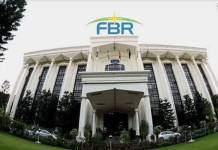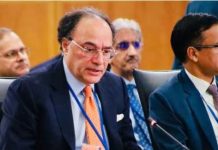ISLAMABAD, APR 21: /DNA/ – The Pakistan Industrial and Traders Associations Front (PIAF) took strong exception of the continued escalation in the petroleum prices, urging the government to give the solid plan of low cost energy provision in the country to improve economic growth.
PIAF Chairman Faheemur Rehman Saigol said that oil and electricity consumers are very easy targets for taxation, with the government preferring to levy higher taxes on them rather than expanding the tax net.
Consumers may face increased taxes in the upcoming budget due to IMF pressure. There are indications that the government may raise the petroleum levy rate in the forthcoming budget to bolster revenue collection from oil consumers.
He said that the federal government raised the prices of petroleum products by up to Rs8.14 per liter this week, marking the second price hike in petroleum products this month.
According to a notification, the price of petrol has been raised by Rs4.53 per liter, from Rs289.41 to Rs293.94 per liter. The price of high-speed diesel (HSD) has also been increased by Rs8.14 per liter, from Rs282.24 to Rs290.38 per litre.
Earlier, the government raised the price of petrol by Rs9.66 per liter on April 1. However, it reduced the price of HSD by Rs3.32 per liter for the first half of the month, effective from April 1 to 15. He said that petrol is predominantly used in motorbikes and cars, with higher usage in Punjab due to CNG stations in the province relying on expensive imported gas rather than indigenous gas. HSD finds extensive use in the transport and agriculture sectors. Therefore, the decision to increase its price is expected to have an inflationary impact on farmers and the general populace.
Faheem Saigol said that presently, the government imposes a petroleum levy of Rs60 per liter on almost all petroleum products, as the International Monetary Fund is urging the government to levy a general sales tax (GST) of Rs18 per liter on petroleum products.
The federal government strategically increased the petroleum levy rate as revenue collected through this levy goes to the federal treasury, while sales tax revenue goes to the provinces. Consequently, the sales tax rate has been reduced to zero to limit provincial revenue collection.
Most of the transport sector runs on HSD. Its price is considered highly inflationary as it is mostly used in heavy transport vehicles, trains and agricultural engines like trucks, buses, tractors, tube wells and threshers, and particularly adds to the prices of vegetables and other eatables. Petrol, on the other hand, is mostly used in private transport, small vehicles, rickshaws and two-wheelers and has a direct bearing on the budget of middle- and lower-middle class.
Faheem Saigol said the industrial and general consumers will be feeling the pinch of high transportation costs as petrol and diesel prices have swelled very high. He strongly condemned the massive hike in petroleum products, saying it would fuel the inflationary pressures and push up the cost of doing business — which is already the highest in the region. He questioned how the existing export orders can be met profitably after the double blow of electricity and petroleum price hikes.
The PIAF chief expressed his concerns that domestic and international demand for Pakistani products would be at an all-time low as inflation has severely affected the purchasing power of the domestic consumers and for international and regional markets, local products have become uncompetitive. He criticised the massive hike in petroleum prices, which would not only impact industrialists but also exert severe economic pressure on the general public.
He lamented the government for affecting the public’s budget by raising petroleum levies and taxes, following the terms set by the International Monetary Fund. He said that inflation is on higher side due to the impact of government’s economic policies of soaring fuel rates, enhancing power and gas tariff, depreciating the local currency and imposing exorbitant duties on imported industry raw material.
Faheem Saigol urged the government to take concrete measures for easing out inflation that has further increased due to rise in oil prices and other essential commodities. He said that oil prices and inflation are closely connected in a cause-and-effect relationship.

















